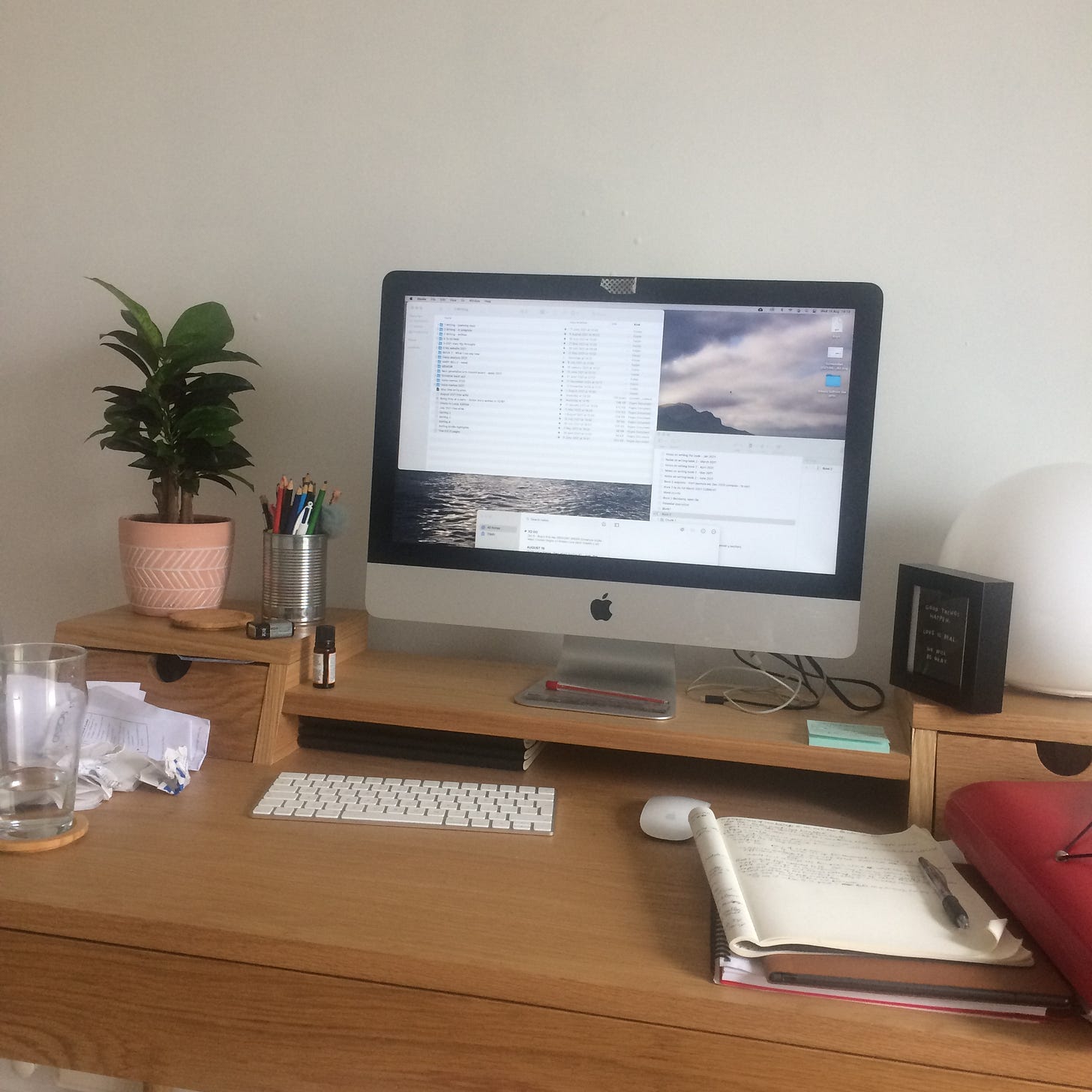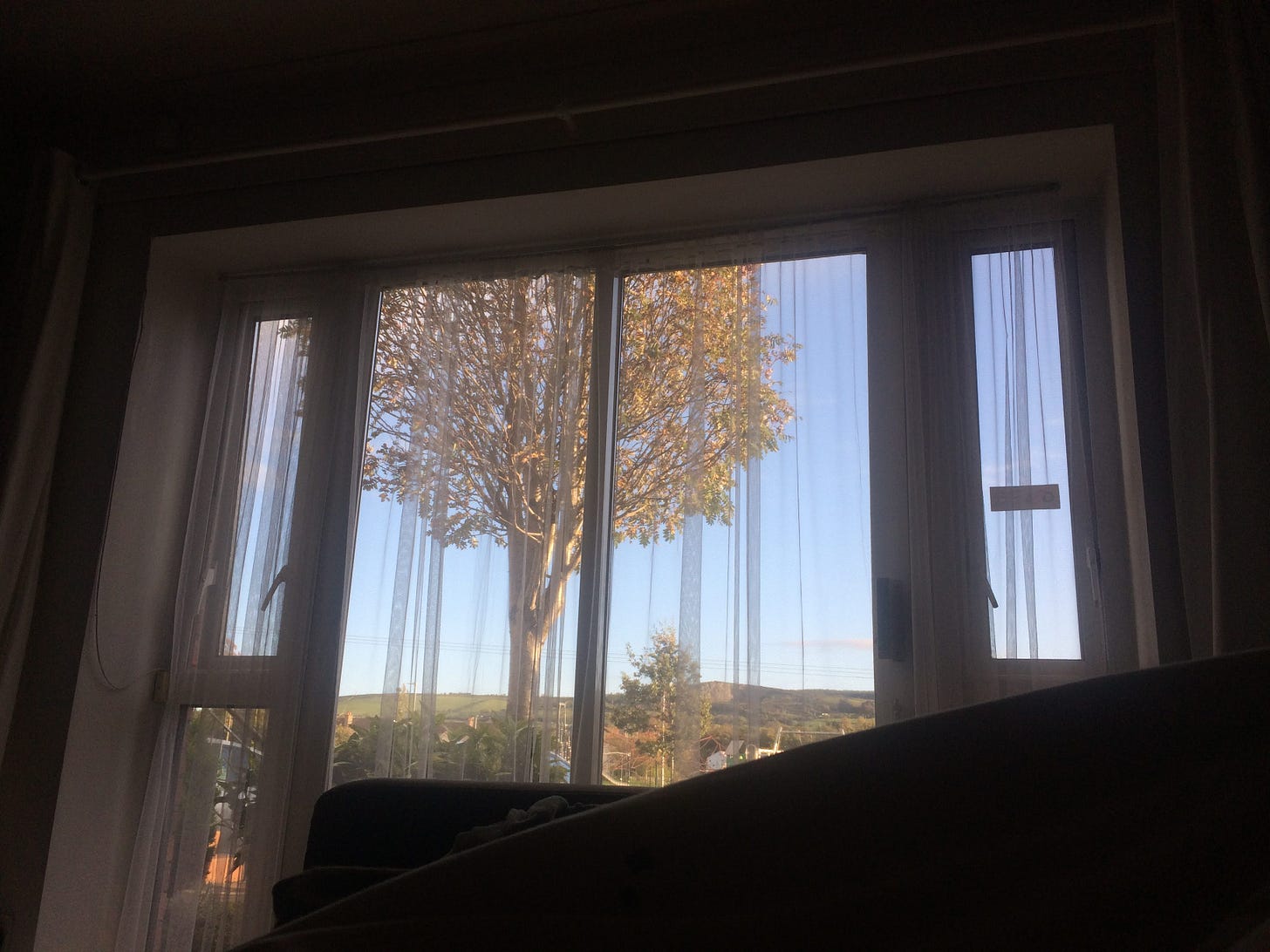I survived only because I am a writer.
How writing helps me process pain, manage triggers and make space for a more joyful life
Welcome to Life after Trauma; I’m Clare Egan. This month, we’re exploring the topic of writing about trauma. Stay tuned for the resources that have shaped my thinking on the intersection of writing and mental wellbeing, and a new interview series exploring the emotional and practical dimensions of writing about trauma. Make sure you're subscribed to get them in your inbox:
Before we begin, please know that I am a writer, not a mental health professional. What follows is a personal reflection on what has worked for me, but only you know what’s right for you. If you’re writing about traumatic experiences, please be mindful of your wellbeing. For me, this work was only possible when I felt reasonably steady in myself and had the support of a good therapist.
When I was 19, my mother was killed in a car accident. Her death was the domino that collapsed the life I’d always known. While grieving, I was also trying to come to terms with the sexual abuse I’d experienced in childhood. Through those heart-breaking years, it was writing that saved me.
I would wake up early and write by hand, unspooling whatever was inside me.“This is how you survive,” I wrote in my journal, “you write your way out”. When I lifted my head from the page each morning, I could feel that my internal landscape was microscopically different. Moving the chaos from inside my head onto the page calmed me. I never had to search for traumatic things to write about; they were always there, pulsing in the tips of my fingers desperate to be free.
I bristle at the assumption that writing is inherently cathartic. For me, the opposite has also been true. Writing about trauma can temporarily tighten its vice grip around my life, but it can also be the most reliable way to excise my pain. The word ‘catharsis’ implies simplicity and ease, but writing about trauma requires a muscular commitment to self-compassion and to showing up for yourself on the page.
Sexual trauma exists in a kind of permanent present tense. I was violated in childhood, but those bodily memories still live between my cells. Like many survivors, my trauma can be triggered by innocuous aspects of daily life. I rarely realized it in the moment, but language has been my primary tool for processing triggers.
When something evoked a trauma from my past, writing helped me to stay grounded in the present.
I did it again recently, when I met a curmudgeonly man in a creative workshop. This man, who was older and bald, kept sticking his tongue out and using its thick muscularity to coat his thin lips with saliva. It was disgusting and impolite, but not threatening though my body didn’t know that. This man reminded me of someone from my past, someone I still have good reason to fear.
During the workshop, I started writing about my classmate’s behaviour. By converting his actions into language, I could see my triggers more clearly. He reminded me of someone dangerous, but this man, nestled in his Zoom box, was no threat at all. This habit of processing my triggers through language has helped me to stay present and observant. It has made me a better writer by sharpening my ability to convert life into language.
Sexual trauma is a stripping away of one’s agency. My core humanity was disregarded, so my childhood body could be used to fulfill a perpetrator’s perverted desires. There were many, many times that my trauma didn’t feel survivable.
Writing helped me to rebuild my sense of self and regain agency over my life. It was the only place (outside of therapy) where I could be my full self.
The page could hold the depth of anguish. I didn’t need to worry about triggering or upsetting anyone, I could just write. For years, I kept those two small words on a Post-it on my desk: Just Write.
Writing helped to make legible the things I was carrying around as shapeless trauma. It helped me figure out what I thought and felt and wanted to do next. It helped me to feel autonomous and strong, even in my most vulnerable moments.
Transcribing the trauma that lived between my cells onto the page helped me see that it was distinct from who I am. I was severely traumatized and suffering deeply, but that wasn’t all of who I was. Writing helped me imagine a better life for myself. As I wrote, I existed in a different psychic space. Most days, I wrote about the same things - a loving partnership, a fulfilling writing career, a safe and joyful life. Looking back, I see that I was tracing the contours of my future and trying to give them more heft and certainty.
Journalling was only one part of my process. Sorting my work was an equally important step.
I transcribed my journals into word documents, and organized them into a scrivener file labeled ‘Memoir’. I sorted through the journals I’d kept since childhood trying to discern the narrative spine of my story. It was only later, reading Judith Herman’s seminal book ‘Trauma and Recovery1’, that I began to understand how important it is for survivors to regain a sense of authority over their stories. Writing helped me to regain a sense of ownership of my life. It’s not a coincidence that the words ‘author’ and ‘authority’ share the same etymological root: when we own our stories, they become easier to live alongside.
During the pandemic, I wrote my first novel.
It hasn’t been published, but I was profoundly changed by the process of writing it. I invented a fictional protagonist and burdened her with some of my own life experiences: a mother killed in a car accident, a misogynistic workplace and Ireland’s economic collapse in 2008. While the pandemic paused the world, I sat in a room with a pen and paper guiding a fictional version of my younger self through her early twenties. Writing that novel didn’t change what happened in my life, but it changed how I related to it. It brought movement to stagnant pain and allowed me to grieve my experiences in a new way. Once I’d finished the book, I had more space to experiment with other formats. I returned to my dream of being a journalist, and started landing bylines. I started writing fiction that had nothing to do with my life, and found it more exposing to tap into my subconscious rather than letting my conscious mind decide what I wanted to say.
)Over the years, I’ve learned many tactical things which have made this work easier. I’ve learned to write about trauma only early in the day, otherwise my sleep will be haunted by nightmares. I know the importance of self-compassion as a rigorous practice2 and the value of taking breaks in order to focus more deeply on the richness of living in the present. I plan to write about this practical advice soon, but for today, I wanted to share the profound impact writing about trauma has had on both my writing and my life. (If there’s anything in particular you’d like me to write about, I’m always open to suggestions!)
Writing about my trauma helped me to expel my pain from my body and when it was gone, there was a lot more space for a rich, joyful life.
It wasn’t always easy, but it brought me a kind of healing that I haven’t found in therapy or the passage of time or anywhere else. A decade ago, it seemed like I was dwelling in the past, circling the same traumas and making no progress with my actual writing work. With the benefit of hindsight I can see that by respecting the urgency of a throbbing wound, I was finding my way through childhood sexual trauma. It’s one of the darkest aspects of human experience but I survived because I wrote about it.
Writing was the engine that allowed me to propel myself away from my traumatic past and toward a better future. In many ways, I survived only because I am a writer.
If you enjoyed this essay, you might also appreciate:
💕 If this piece resonated with you, please tap the heart below to help spread the word.
💬 In the comments, I’d love to hear your reflections on writing about trauma. Are there particular aspects of this topic that you’d like me to explore in more detail? What are the things that make your own writing feel more fraught or complicated? And what makes it feel like you’re liberating yourself as you accumulate new words on the page?
I’ve previously written about the books that have helped me heal.









Clare, this was a phenomenal essay! So honest and true and how glad I am for you that you had your gift for writing and the determination to
Use that gift to help you heal and share your experience with others, so they’d feel less alone on the healing path. Beautifully written; so many passages I loved. As for my experience about writing about trauma, the greatest trauma of my life so far is my mother’s death at 87 from dementia. And even though I was blessed to have her for so long, the trauma of being her sole care provider at home the last harrowing two years of her life haunt me in ways she would not want. So much of the writer in me is so scared to go right to the center of what I’ve still to process: my guilt, that I wasn’t enough, didn’t do enough, broke my promise to her from years earlier and transferred her to a memory care facility for what would be her final eight months because I was falling apart, losing myself. And yet there’s a part of me, 17 months after her death, that can’t forgive myself. Because I fear the move to memory care made her worse, that she felt abandoned. This is the trauma I need to write through. Clare, how does one even begin to write about the things you’d rather not look at—like how my good daughter persona was a facade (or that’s what a cruel voice still inside me says). Thank you for being brave, Clare, and showing us what’s possible by writing through and hopefully out of trauma.
Yes, years and years of journals, notebooks, napkins. Some of it poetry, some of it short essays, some of it just screaming into the void. In the process, I wrote myself into being.